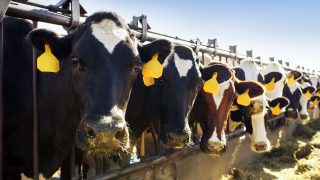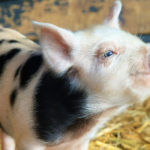
Factory Farm Moratorium (Oregon)
S.B. 85
Coalition working to create a moratorium on the construction of new factory farms, and the expansion of existing ones, in Oregon.
Status
Another update out of Oregon: In August 2023, the Easterday family ceased its attempt to acquire permitting for a 30,000-cow mega dairy. Read more.
Oregon is in the midst of a factory farming crisis. These facilities, where thousands of animals are confined in cramped and filthy conditions, are harming animals and polluting the state’s air and water. The Animal Legal Defense Fund is a member of the Stand Up to Factory Farms coalition, which has been working to stop the spread of factory farms across Oregon.
One aspect of this work has involved the introduction of legislation, S.B. 85, that would create a moratorium on the construction of new industrial Confined Animal Feeding Operations (CAFOs), as well as the expansion of existing ones, defined by the Oregon Departments of Environmental Quality and Agriculture by the large numbers of animals they confine.
Modest attempts at improving oversight of factory farms have done little to mitigate their impacts. A moratorium is critical to prevent more factory farms from opening in Oregon while officials address problems related to existing ones.
In 2017, the Oregon Department of Agriculture approved the now-infamous Lost Valley mega dairy in Morrow County. Mega dairies are industrial dairy facilities that confine more than 2,500 cows. Lost Valley repeatedly flouted environmental regulations, violating its water discharge permit more than 200 times, racking up hundreds of thousands of dollars in fines, and endangering community residents and wildlife by contaminating the air and water.
Despite the Lost Valley disaster, Oregon has not yet enacted meaningful regulations to mitigate the impacts of mega dairies. Meanwhile, the state continues to consider the expansion of mega chicken operations in Marion and Linn counties that would see millions of chickens raised each year for human consumption. The proposed expansions would make these industrial chicken operations the largest of their kind in the state, with 3.5–4.5 million chickens suffering in crowded barns.
Additionally, state agencies are still considering permitting a new 30,000-cow mega dairy, Easterday Dairy, on the same site as Lost Valley Farm, despite the fact that Easterday has faced a series of financial scandals since applying for the permit.
A cow on a mega dairy will spend almost her entire life in a concrete-and-metal building until her body gives out, and she’s shipped to slaughter. Cows’ bodies aren’t designed to stand on hard surfaces, resulting in foot damage and aggravating lameness. And though cows are deeply bonded to their young, they’re separated from their calves almost immediately after birth. Other types of factory farms are not better — for example, female pigs are commonly confined to gestation crates so small and cramped that they cannot stand up or turn around, and they often get open sores from the contact with the crate.
Factory farms are designed to extract as much as possible from these animals, without regard for their needs. These hardships that affect an animal’s physical and mental health are not limited to cows but are felt by all animals on factory farms.
In addition to the suffering factory farms inflict on animals, they also endanger the environment and neighboring residents by polluting the air and water, as well as depleting the state’s water supply. Oregon’s rivers, streams, and aquifers are already strained by residents’ demands, and mega dairies are sucking nearby aquifers dry.
In August 2022, the Animal Legal Defense Fund was one of the 22 organizations that, together, filed a petition for rulemaking with the Oregon Environmental Quality Commission. Led by members of the Stand Up to Factory Farms coalition, petitioners demanded the Commission take immediate action to address the dangerous air pollution emitted by mega dairies across the state. The proposed regulatory program would target the staggering amount of climate-altering methane emitted by these facilities, as well as several air pollutants that pose a serious threat to human and environmental health.
In the fall of 2020, the Animal Legal Defense Fund, working with a broad coalition, petitioned the Oregon Water Resources Commission to restrict withdrawals for stockwatering from eastern Oregon’s strained aquifers. All industrial animal agriculture facilities use huge quantities of water, but mega dairies are particularly water-intensive. If mega dairies expand in critical groundwater areas in the state, water reserves will be further threatened.
Sign Up!
Join the Animal Legal Defense Fund's email list to stay up to date on lawsuits, legislation, and regulations affecting animals.


